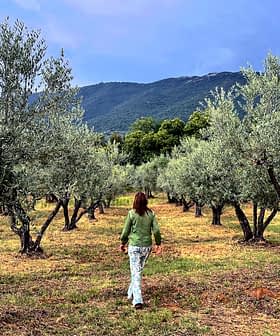Women Take Center Stage at Italian EVOO Literary Competition
The award ceremony also saw the launching of the Mediterranean Olive Oil Women’s Network and was an opportunity for a Jordanian agriculture official to showcase her country's progress.
The winners of the third Ranieri Filo della Torre international literary prize have been announced.
At Palazzo della Valle, in Rome, where the headquarters of the general confederation of Italian agriculture, Confagricoltura, are located, 11 awards were handed out for scientific writings, historical essays, poetry and fiction.
The international openness of the award… allowed us to achieve the objective of our association, which is to bring as many people as possible (together), with no borders, closer to the wonderful world of extra virgin olive oil.
The annual competition, which is organized by Pandolea, seeks to recognize and promote extra virgin olive oil culture in literature. Entries are already open for next year’s competition.
“This has been a special and much-welcomed edition marked by a growing interest amongst participants, public and experts,” Loriana Abbruzzetti, the president of Pandolea said. “The international openness of the award, with the presentation of the Mediterranean Olive Oil Women’s Network, attracted the interest of a wider public, and allowed us to achieve the objective of our association, which is to bring as many people as possible [together], with no borders, closer to the wonderful world of extra virgin olive oil.”
See Also:Fairs and CompetitionsIn the science category, Alessio Scalisi, from the University of Palermo, was one of the winners for his doctoral thesis about fruit and leaf sensing for the continuous monitoring of tree water status in high-density orchard systems.
Ana Srbinovska, from the University of Udine, also won an award for her Master’s thesis regarding the determination of n‑alkanes in vegetable oils.
Valentina Bertoz, also from the University of Udine, picked up the third award for her Bachelor’s thesis on the evaluation of the antioxidant content of vegetable oils as a function of refinement.
In the history category, Elisa Maria Fiocca and Maria Grazie Caffè each picked up awards for their essays: Amori, Ulivi e ‘Kanun’ (Loves, Olive Trees and ‘Kanun’) and Mottola ‘La spia dello Ionio’ (Mottola ‘the Ionian’s spy’), respectively.
In the poetry section Dominga Carruba, Franca Chiappetta and Milena de Magistris von Rex each won for their poems: Del Canto (On Singing); L’ulivo (The Olive Tree) and La terra l’Uomo e quel frutto… (The Land, the Human, and that Fruit…), respectively.
For the fiction section, Amina Valentini won for Una madre e una sinolea (A Mother and a Sinolea); Antonietta Tiberia won for Il baratto (The Bartering); and Beniamino Cardines won for Il patto dell’olio (The Pact of Oil).
Ranieri Filo della Torre was the general director of Unaprol and made significant contributions to the Italian olive oil sector’s development. Three years ago, Pandolea came up with an olive oil-themed literary contest dedicated to his memory, which has since allowed individuals from around the world to contribute.
The event was also a moment to mark the launch of the organization’s new Mediterranean Olive Oil Women’s Network.
“[The work of this association] is one of a kind, as we aim at promoting olive oil through our womanhood,” Abbruzzetti said. “This means acceptance, openness, embrace, and caring for the future of our children.”
Jordan is one of many countries in which the work of women is driving the sector forward. Nehayah Almuhaisen, the director of the olive oil division of the Jordanian Ministry of Agriculture, joined Abbruzzetti to speak about the state of the olive oil sector in her country as well as the role of women in promoting the country’s olive oil culture.
“In Jordan, olive trees cover 77 percent of the tree-planted area of the country, while most of its farmers are olive growers,” she said. “Many typical Jordanian dishes are olive oil-based, nevertheless we need to raise ever more knowledge on this great product amongst consumers since high prices can be a reason for a decrease in consumption.”
Almuhaisen emphasized the need for producers to connect with consumers and said that events, such as Pandolea, were great opportunities for these types of interactions to take place.
“In the light of the potential of the sector, we are working on increasing the awareness of consumers and producers on the importance of high-quality extra virgin olive oil,” Almuhaisen added. “Making the new generation aware of healthy eating habits and how to make good use of the sensory evaluation of olive oil is a goal shared with Pandolea.”
“This invitation to be part of an international network who aim at promoting extra virgin olive oil encourages me and my team to continue our work,” she added. “We are looking forward to the next events with the countries which will join us.”
Abbruzzetti said that she hoped that events such as this one will help olive oil producers, especially women, from around the world to connect and share their ideas.
“The work with the Jordan team provided a great opportunity to exchange views and for growth,” she said. “For this reason, by involving women professionals from the other countries, we aim to create a constructive debate on extra virgin olive oil at a global level, with the goal to boost the whole sector.”
Greece will be the next country to join the olive oil women network, while contact has been made with Argentina to discuss the possibility as well.
“We called it ‘Mediterranean’ because we started here, but the call is open to women professionals in the olive oil sector all over the world,” Abbruzzetti said.








